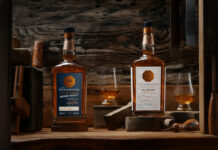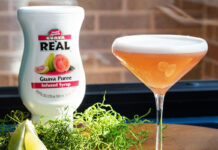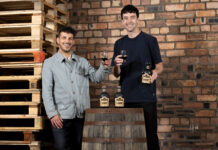Beyond the sugar tax: more growth is expected for healthier mixers

[box style=”0″]
Highland Smash
- 3 medium strawberries
- 1 tbsp maple syrup
- 3 torn abasil leaves
- 50ml dry gin
- Highland Spring Sparkling Water
- Black pepper to taste
Method: in a tumbler add the strawberries and maple syrup. Crush the strawberries into a pulp. Add the torn basil leaves and fill the glass with ice. Pour over gin and top with the sparkling water. Stir the ingredients together. Pop a strawberry slice and a basil leaf on top to garnish and grind over black pepper.
– Supplied by Highland Spring.
[/box]
IT has been six months since the Soft Drinks Industry Levy, more commonly known as the sugar tax, was introduced in the UK, prompting moves from producers into reformulating recipes or increasing their sugar-free variants.
The charge, which came into effect on April 6, is part of a Westminster anti-obesity strategy designed to encourage the general public to consume healthier products – but the trend towards better living is said to have been in motion well before this spring.
And operators have been advised that the demand for healthier choices will continue to grow in the coming years – and to adapt their offers accordingly.
While saying it was “still too early to tell” what the initial impact of the sugar tax had been on soft drinks sales, Nichola Grant, channel marketing manager for Highland Spring Group, said the move towards healthier drink choices will keep gathering pace.
“The increasing consumer and media focus on health as well as the imposition of the sugar tax continues to be a major consideration for consumers when choosing between drinks,” she said.
“Research shows that 36% of consumers are more concerned with sugar in food compared to the previous year, showing that consumers were beginning to make healthier choices prior to the introduction of the sugar tax.
“The health trend will continue to grow as consumers continue to adapt to healthier lifestyles.”
Emma Cotton, communications director at Luscombe Drinks, reckons the swing toward consuming less sugar-sweetened drinks is evidenced in sales.
She said: “For the first time sales of bottled water have exceeded sales of cola; this has been driven by the trend towards healthier low-calorie drinks with reduced sugar content and the success of premium sparkling waters.”
Underlining the need for operators to stock more options to suit this growing demographic of consumers who wish to watch their sugar intake, Mark Bell, strategy and planning manager at Red Bull, stated licensees would have to consider giving such options greater prevalence in their outlets if they had not already.
He said: “With the heightened importance placed on the health agenda over the past year and the Soft Drinks Industry Levy in place, consumers are swaying towards sugar-free options.
“Therefore it is imperative that the on-trade offers a low-calorie alternative – meaning that a higher proportion of space is dedicated to low-calorie products.”
When it comes to making reduced sugar mixed drinks, be it spirit mixer or cocktail serves, Grant at Highland Spring Group, believes there is “untapped opportunity” in utilising sparkling water in bars’ drinks offers.
She said: “It is the only mixer with no calories, no sugar, no preservatives and no additives.
“Naturally sourced sparkling water is a perfect alternative to sugary mixers and lots of consumers prefer adding sparkling water to alcoholic beverages instead of soda water as its mineralogy contributes to a clean and cooling flavour profile while the smaller size of the bubbles give a more pleasing texture and mouthfeel.”
And when looking at how to make the most of healthier mixers, Jen Draper, head of marketing at Franklin & Sons, recommended that licensees looked at more than just sugar and calorie content and looked at how their soft drinks are sweetened.
“Naturalness will be the key to category growth as consumers start to understand the use of artificial sweeteners more and realise they don’t want to compromise on flavour,” she said.
“There is a growing desire for natural soft drinks with ‘real’ ingredients.”




















